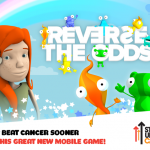 Citizen science is cool, and I’m without doubt a major fan of it as a concept. I’ve written a few times on the blog about the various games that have been developed that allow players to contribute to scientific research whilst playing the game.
Citizen science is cool, and I’m without doubt a major fan of it as a concept. I’ve written a few times on the blog about the various games that have been developed that allow players to contribute to scientific research whilst playing the game.
For instance, Eyewire is a game that aims to improve our understanding of neuroscience. Phylo is a logic game that aims to bolster our knowledge of genetics. EteRNA is a game that explores the folding patterns of RNA, whilst NOVA is tackling a similar issue, but with the hope that it will get youngsters involved.
Some really cool projects in other words. The latest citizen science game to hit the market has been launched recently by Cancer Research UK. The game, called Reverse the Odds, is a mobile game available on both Apple and Android platforms.
Players take control of creatures who inhabit a world that is breaking apart. You are tasked with completing various puzzles that help the creatures to improve and rebuild their world.
All of which is nice enough, but how does this help with cancer research? Well, the designers have integrated analysis of cancer into the game play itself, so players will be shown images of real tumour tissue donated to the game by former cancer patients. As players answer questions based upon the images, it’s hoped that the researchers will gain a greater understanding of the disease. The questions include some of the following:
- How many cancer cells do you see?
- How many cells are blue?
- How strongly are these cells glowing?
The game is specifically hoping to gain an understanding of biomarkers for bladder cancer. The researchers want to learn more about what biomarkers could be a reliable indicator of how the patient will respond to specific treatments, such as radiotherapy and surgery.
Suffice to say, removing a bladder is a pretty big deal, so getting the decision right will have a big impact upon the quality of life of the patient.
As with most of the games highlighted at the start of the post, there is some training provided to each gamer, with each set of data analysed by multiple players to hopefully ensure the reliability of the project.
Overall, it’s a nice project that will hopefully enroll a large number of people in the battle against cancer. You can learn more about the game via the video below, or download the game for iOS and Android.
Nice. I love seeing projects like this.
Brilliant. Hopefully they'll get lots of people playing.
Hopefully so Nick. I'll certainly do my best to spread the word.
As an avid mainstream video game player (along with most of the members of my family), I wonder how long it will take, or if it is even likely to ever happen, for these types of elements to be included in everyday games available on next generation consoles.
For instance, Samsung has the "Power Sleep" app that essentially donates processing power to help decrypt protein sequences for researchers at the University of Vienna. There's another similar outfit, BOINC from UC Berkley that allows you to do the same thing with your computer for various causes.
While I understand that these are more passive opportunities to help a good cause, modern video gaming is a huge subculture (think Frank Underwood playing Call of Duty on House of Cards) and if we could find a way to integrate this sort of thing into something millions upon millions of people are already doing, think of the research progress that could be made in just a matter of months.
It's happening, albeit slowly. I wrote about the Games for Change festival last year – http://adigaskell.org/2013/07/29/can-games-delive…
http://www.gamesforchange.org/
They're probably at the forefront of the movement you describe of games including social good elements in them as par for the course.
Awesome idea. Consider the word spread.
I absolutely love this kind of story. Fantastic stuff.
That was an astounding feature, and i am truly eager to realize that it simply got colossal levels. At that point its going to be a decent time being to me in my excursions. I might want to add this amusement to my rundown and have a fabulous time.
When I got this game I clearly considered it an exercise in futility.Anyway,when I began playing it,it was so fun !!I completely think in the event that you like problem solving games it is useful for you.a exceptionally well made puzzle game with an opportunity to help with research.@Betty Allen.
Thanks for your post, it’s great to learn about games like these that have the potential to do so much good in the future. I’ll make sure I share this with my friends.
When I got this game I clearly considered it an exercise in futility.Anyway,when I began playing it,it was so fun !!I completely think in the event that you like problem solving games
Once you get a high score in the 6,000-7,000 range (For the competitors out there, mine's 9,863) besting it becomes the new fun challenge.
This is brilliant – love it.
Informative, Thanks Great! it’s a one more step forward for the advancement. Keep doing the good work, Ed Marti!